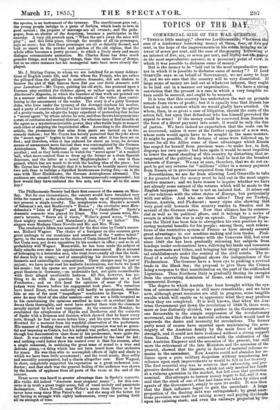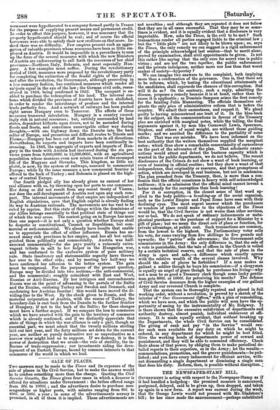TOPICS OF TII - BA Y ) ." )
COMMERCIAL SIDE OF THE VAit QUESTION.
" THERE is little analogy," observes Lord anville, 4iietweei th ease of a landowner borrowing money a -three, four; or five pe cent, in the hope of the improvements on his estate bringing an' tenet of seven per cent, and the case of the-s-ountry borrowing at an interest of five six, or seven per cent, and layin'oltddhisjpepey in the most unproductive manner, in a pecuniary point of view, in which it -was possible to disburse sums of money.'
But is the money to her" laid out in the most unproductive _man-
ner in which it is possible to disburse sums of money"? If Lord Granville says so on behalf of Government, we are sorry to hear it, and we are sure that the country will be very dissatisfied. If large sums of money are laid out at whatever interest, they ought to be laid out in a manner not unproductive. We have a strong conviction that the present is a case in which a very tangible re- turn could be secured, and ought to be secured.
It is true that this country has undertaken the war on grounds remote from views of profit; but it is equally true that Ramie has forced-us into a contest which we would gladly have avoided. On whom, then, in so great a case of litigation, should the costs of the action fall, but upon that defendant who has himself provoked the appeal to arms? If the money could be recovered from Russia in the form of a direct payment into court, it would be only the due of justice. We have indeed no expectation that the costs can be so recovered, unless it were at the further expense of a new war, whose costs would again have to be sought in the same manner It might be possible, if the fortune of arms were followed up, to secure for all the Allies some of those advantages which Russia has reaped for herself from previous wars—to make her, in fact, disgorge her own spoils : but here again it would be most impolitie to lower the moral standing of this country by disturbing that ar- rangement of the political map which shall be best for the broadest interests of Europe. We say at once, therefore, that we do not ex- pect to get any returns for "millions " either in a money payment from Russia or in provinoes _acquired from that power. Nevertheless, we are far from allowing Lord Granville to take it for granted that the money must be laid out in the most -unpro- ductive manner; and we -have reason to inquire whether we have not already some earnest of the returns which will be made to the English taxpayer. The war is not an isolated fact. It arises out of our relations with the other states of Europe, but particularly with our allies. And who are those allies ? They are Turkey, France, Austria, and Piedmont ; -many signs also showing that -very good-will -towards this country resides in Sweden and in several of the -German states. Now that alliance has its commer- cial as well as its political phase, and it belongs to a series of events in which the war is only an episode. The Emperor Napo- leon the Third has been fain to strengthen his own position by se- curing-material benefits for his people ; among them, such relaxa- tions of the restrictive system of Francs as have already secured great advantages to our machine-making and iron trades. .Pied- mont does not begin her reforms with the Convents Bill, -but ever since 1848 she bas been gradually releasing her subjects from bondage under ecclesiastical laws, relieving her lands and resources from mortmain and 'tithes, and bringing her clergy and ecclesiasti- cal establishments under the control of the civil courts. The re- fusal of a subsidy from England shows the independence of the Piedmontese. The Genoese have a keen eye to pushing a revived trade in the Black Sea; the proposal to give them the Crimea being a response to that manifestation on the part of the stiffnecked Ligurian& Thus Northern Italy is gradually freeing its energies from the enervating dominion of Rome, and annexing itself to eommercial Europe. The degree to which Austria has been brought within the sys- tem of commercial Europe is still more remarkable ; and we have now, although great measures are still in progress, some tangible results which will enable us to appreciate what they may produce when they are completed. It is well known, that when the Aus- trian Government put down the revolution of 1848-'9, there were, more or less distinetly divided, two parties in the Government,— one favourable to the simple suppression of the revolutionary movement, and the other to material reforms which would tend to supersede the desire and necessity for revolutions. The former party must of course have counted upon maintaining the sove- reignty of the Austrian family by the main force of military strength, and it could not have reckoned without a strong support from Russia. The events connected with the abdication of the late Austrian Emperor and the accession of the present, but still more the retirement of the late Ministers and the accession of the present, showed that the party in favour of material reforms re- mains in the ascendant. Now Austria could not abandon her re- liance upon a pure military despotism without transferring her reliance upon such improvements as would be felt in her treasury The first essential step was to retrieve that exhausting not only marked heru and pro- gressive decline of the finances, which at a ruinous quotation in the market, but left even that quotation nominal. Herattempts to borrow money began to fail, an...d it was said that the stock of one of her last loans was taken by allies and agents of the Government, simply to save its credit. It was then that the Bach influence began to gain the ascendant. .6.1arge proportion of the floating debt was extinguished; by great. exec-
money and paying dividends dons provision was made for raising
upon the ezietiag stock, and even the railways projected by Go-
vez-nment were hypothecated to a company formed partly in France for t he purpose of supplying present means and permanent credit. In order to effect this purpose, however, it was necessary that the property hypothecated should be real ; and of course the official borrowers were able to satisfy their new creditors on that score. In- deed there was no difficulty. Few empires present such an aggre- gation of valuable provinces whose resources have been so little em- ployed as Austria. It would be impossible in a parenthesis to sum up the force of the several measures with which the new Ministers of Austria are endeavouring to call forth the resources of her chief provinces—Northern Italy, Bohemia, and most especially Hun- gary. A few examples must suffice. During the revolutionary period of 1848, measures were proposed by the revolutionary party for completing the extinction of the feudal rights of the nobles ; and after the revolution, the Government, although proceeding in a less summary fashion, has continued measures which render all suhjects equal in the eye of the law ; the German civil code, resus- citated in 1848, being confirmed in 1852. The occupant is en- abled to purchase the redemption of his land. The internal cus- toms win& divided the provinces of Austria have been abolished, in order to render the interchange of produce and the internal trade perfectly free. And a network of railways has been pushed right across Hungary even to Temesvar. The effects of these measures transcend calculation. Hungary is a country exceed- ingly rich in natural resources ; but, entirely surrounded by land states, dependent hitherto upon rivers, not to be ascended during floods and frosts, and sometimes unnavigable either way during droughts,—with one highway down the Danube into the back cellar of Europe, and precarious and difficult routes to Trieste and Fiume,—Hungary has been cut off from markets in all directions. Nevertheless, its exports and imports have been continually in- creasing. In 1846, the aggregate of exports and imports of Hun- gary in the trade with Austria had increased during the six pre- vious years from 9,600,000/. to 12,000,0001., with an agricultural population whose manners even now retain traces of the encamped life of the Magyars and Slovacks. This kingdom, so little ex- -ploite, is now, by the system of railways, annexed to commercial Europe ; while by the same measure a new commercial frontier is offered to the back of Turkey ; and Bohemia is placed on the high- way of central Europe. Our fourth pledged ally has already given us earnest of her real alliance with us, by throwing open her ports to our commerce. Her doing so did not result from any recent treaty of Vienna; nor does the self-development of Austria rest upon any such com- pact. The internal movements of that empire are independent of English stipulations, save that English capital is already finding its way to Austrian railroads. The movements are too vast to be ruled by caprice. But this state of things within the dominions of our Allies belongs essentially to that political state of things out of which the war arose. The contest going on in Europe has more than one aspect—it is not only a question whether Europe shall be despotic or constitutional, Cossack or Republican, but com- mercial or anti-commercial. We already have results that enable us to appreciate the effect of either influence. Russia has an-- nexed many rich provinces to her empire, and has all but extin- guished them politically and commercially. Austria was half- annexed commercially—for she pays yearly a ruinously extra- vagant tribute in salt to her helper in the Hungarian war, and has conformed to the exclusive system of pure military rule. State insolvency and statesmanlike sagacity have thrown her over to the other side; and by meeting her half-way we have confirmed her adhesion to the better system. The gain must be reciprocal. For the purposes of the present question, Europe may be divided into two sections,—the anti-commercial, and the commercial ; roughly coincident with East and West, Russian or Anti-Russian. By her intrigues and encroachments Russia was on the point of advancing to the portals of the Baltic and the Euxine, enclosing Turkey and Sweden and Denmark, and confirming her Austrian frontier : this would have moved the di- viding-line to the West. By the check given to Russia, and the material cooperation of Austria, with the rescue of Turkey, the boundary-line is cast back from the Danube to the further frontier of Hungary, if not to the back of the Baltic; for these changes must have a further sequel. If we compare the loss to commerce which we have averted with the gain to the territory of commerce which is already confirmed, and if we distinctly appreciate that state of things in which the war-alliance is only a part, though an essential part, we must admit that the twenty millions sterling laid out last year, and the forty millions set down for the current year, are neither so purely destructive nor so unproductive as a narrow view might lead us to suppose. If we destroy, it is the power of destruction that we crush—the rule of sterility, the in- fluence of trade-suppression ; our investments aiding the deve- lopment of an Eastern Europe, bound by common interests to that commerce of the world in which we lead.



























 Previous page
Previous page